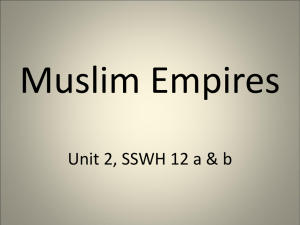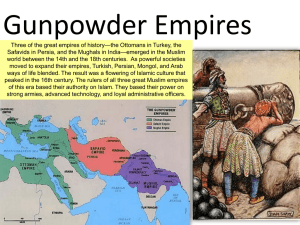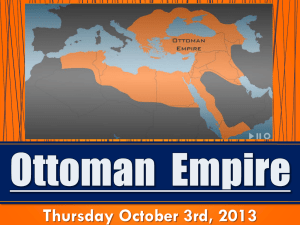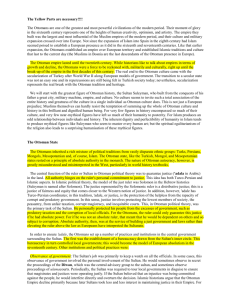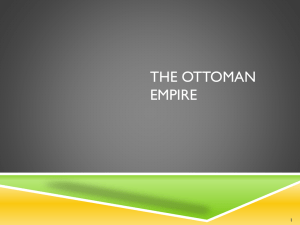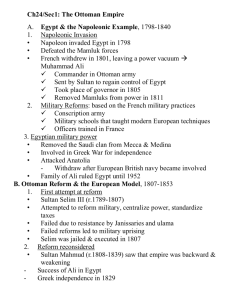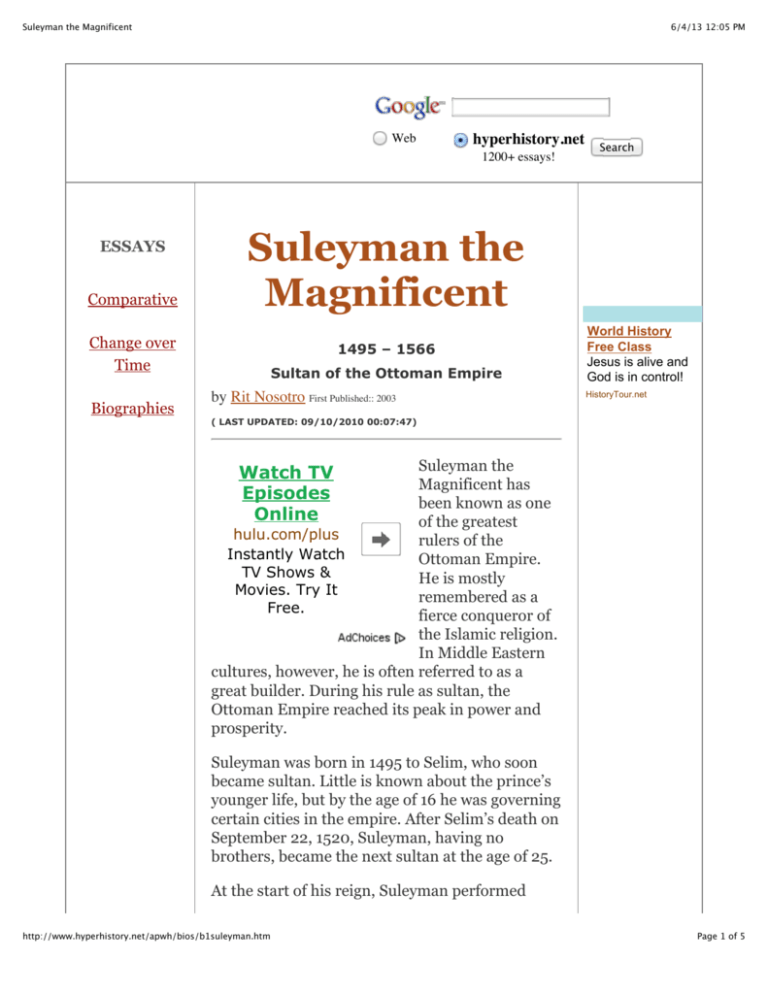
Suleyman the Magnificent
6/4/13 12:05 PM
Web
hyperhistory.net
1200+ essays!
ESSAYS
Comparative
Suleyman the
Magnificent
Change over
Time
Biographies
Search
1495 – 1566
Sultan of the Ottoman Empire
by Rit Nosotro First Published:: 2003
World History
Free Class
Jesus is alive and
God is in control!
HistoryTour.net
( LAST UPDATED: 09/10/2010 00:07:47)
Suleyman the
Magnificent has
been known as one
of the greatest
hulu.com/plus
rulers of the
Instantly Watch
Ottoman Empire.
TV Shows &
He is mostly
Movies. Try It
remembered as a
Free.
fierce conqueror of
the Islamic religion.
In Middle Eastern
cultures, however, he is often referred to as a
great builder. During his rule as sultan, the
Ottoman Empire reached its peak in power and
prosperity.
Watch TV
Episodes
Online
Suleyman was born in 1495 to Selim, who soon
became sultan. Little is known about the prince’s
younger life, but by the age of 16 he was governing
certain cities in the empire. After Selim’s death on
September 22, 1520, Suleyman, having no
brothers, became the next sultan at the age of 25.
At the start of his reign, Suleyman performed
http://www.hyperhistory.net/apwh/bios/b1suleyman.htm
Page 1 of 5
Suleyman the Magnificent
6/4/13 12:05 PM
many acts of kindness and mercy toward his
people including freeing hundreds of slaves,
bestowing his officers with gifts, and erecting a
school for slaves. In return for his kindness,
Suleyman demanded complete loyalty of all his
subjects. Suleyman’s kindness was a sharp
contrast to the acts of his cruel father, who had
become known as Selim the terrible. While Selim
had only been interested in war, Suleyman filled
his palace with music and poetry. Suleyman
himself came to write many poems of his own.
Within a year of his ascension to the throne, the
sultan led a campaign against the Ottoman
Empire’s Christian enemies, the Hungarians.
Within twenty-eight days, the Turks led by
Suleyman captured Belgrade, which was a
strategically important city on the Danube. He
then turned his attention toward the island of
Rhodes, where lay a fortification of Christian
knights, who had been terrorizing Turkish trading
vessels. Suleyman gathered a huge army
consisting of more cannons than had ever been
amassed for any battle up to that time. The
knights fought well and held the Turkish forces
back for months. However, Suleyman was
persistent and finally captured the fortification.
The sultan’s first two victories at Belgrade and
Rhodes were feats that had been attempted and
failed by his predecessors, so Suleyman was
honored with great festivities upon his return to
Constantinople, the Turkish capitol. These
distinguished victories were only the beginning of
Suleyman’s grasp for power.
The City of
Chengdu
www.gochen…
Fortune
magazine
called Chengdu
a magnet for
multinational
companies
Please Report
Inappropriate Ads
Suleyman strengthened his military a great deal
from the start of his rule. He had hundreds of
cannons constructed and expanded his army of
janissaries, elite Turkish warriors, by several
thousand. He also had fleets of warships built that
yielded an impressive navy. With this navy, the
Turks were able to control the Mediterranean and
terrorize passing ships for their spoil.
During his forty-six year reign, Suleyman
undertook thirteen military campaigns of
http://www.hyperhistory.net/apwh/bios/b1suleyman.htm
Page 2 of 5
Suleyman the Magnificent
6/4/13 12:05 PM
conquest. He managed to conquer large parts of
Hungary, Austria, and nearly Rome. The
everlasting problem confronted by Suleyman’s
military was cold weather. The strong points of
the Turkish forces were its cavalry and cannons.
The cavalry could not operate well in the harsh
northern conditions, while the cannons became
very difficult to transport. As a result, Suleyman
found that he could only conquer as much ground
as he could gain in good weather and then must
return to his capitol.
However, through his many conquests, the piracy
of his navy, and tribute and gifts from other
nations, Suleyman became one of the richest men
of all time. His lifestyle at his palace displays his
wealth. He would never wear the same clothes
twice, he ate out of solid gold plates encrusted
with jewels, and his harem consisted of over 300
women.
When his empire reached a reasonably large size,
Suleyman was content to build on his land. He
had many extravagant mosques built for he was
very loyal to Islam. Other constructions during his
time included schools, city walls, and an aqueduct
that surpassed any built in Rome.
Suleyman had a son, Mustafa, with “Rose of
Spring”, a member of the royal harem. However,
soon after, he met Roxelana, a slave newly
captured from Poland. He immediately was taken
with her and favored her above all other women.
She bore him five children, three sons and two
daughters. Roxelana’s only motive, however, was
power. She influenced the sultan to send Rose of
Spring away to live in a distant city. So, despite
Rose of Spring being the ‘first sultana’, Roxelana
was the favored one and held more power.
The only other person with more power below the
sultan now was Ibrahim, the grand vizier of the
empire. Roxelana saw him as a threat to her so
she convinced Suleyman that Ibrahim was
plotting to overtake the kingdom. Suleyman
believed these lies and had Ibrahim executed.
http://www.hyperhistory.net/apwh/bios/b1suleyman.htm
Page 3 of 5
Suleyman the Magnificent
6/4/13 12:05 PM
In later years, when Suleyman was growing old, in
his late fifties, Roxelana worked toward a new
goal. By tradition, when Suleyman was to die, it
would be the firstborn son, Mustafa, who would
be the next sultan. However, Roxelana wished one
of her sons to rule. She started rumors that
Mustafa was plotting to kill Suleyman and take
power for himself. When word reached Suleyman,
he called his son to him and had him executed.
Despite being able to conquer other nations in
battle and ruling a large empire, he could not run
his own household and this cost him dearly.
In 1566, at the age of 72, Suleyman set out on his
last campaign against the Romans. He was in bad
physical condition so he did not live to see the end
of it. He died in his tent on September 5, 1566.
Roxelana’s son, Selim became the next sultan.
However, Suleyman had not raised his son well,
nor had he taught him how to perform the duties
of a sultan. As a result, Selim was weak and
disinterested in political affairs. The succeeding
sultans were no better, and this eventually led to
the decline of the Ottoman Empire.
During his lifetime, Suleyman conquered many
lands, constructed great wonders, and led his
nation to prosper. His hostility towards the
Christian empires was a major factor in the
growth of Islam. However, he could not master
his own household and this led to his downfall
and the downfall of the Ottoman Empire.
Sources:
1. Merriman, Roger. Suleiman the Magnificent.
New York. Cooper Square Publishers, INC. 1996.
2. Barber, Noel. The Lords Of The Golden Horn.
London. Macmillan London Limited. 1973.
3. Conquerors, Suleyman the Magnificent. TLC,
The Learning Channel.
Discovery Communications, Inc. 1996.
Further study on Suleyman the Magnificent
can be conducted through free online history
classes.
http://www.hyperhistory.net/apwh/bios/b1suleyman.htm
Page 4 of 5
Suleyman the Magnificent
6/4/13 12:05 PM
There are many great schools offering Open
Coursware (OCW) classes for lifetime learners.
Disclaimer:
The
above
essay
was
donated
to
hyperhistory.net.
Kindly
inform
ritnosotro@gmail.com
of
inaccuracies
or
plagiarism.
Post a
link to
this
essay,
<a
href="
http://www.hyperhistory.net/apwh/bios/b1suleyman.htm">
a
great
essay
</a>
on
your
blog
or
website
:
Copyright © 2000-2010 www.hyperhistory.net, all
rights reserved
http://www.hyperhistory.net/apwh/bios/b1suleyman.htm
Page 5 of 5



